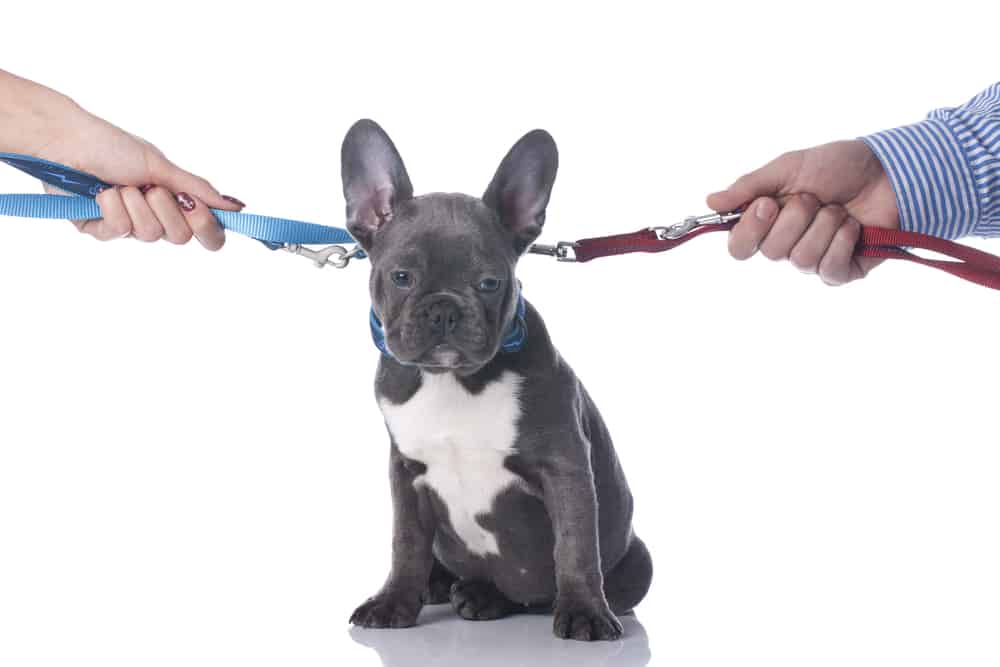“This post contains affiliate links, and I will be compensated if you make a purchase after clicking on my links.”
In a couple, dogs are as significant, loved, and cherished as kids. So when it comes to divorce, deciding upon who gets the pet (and what shall the other party do in this case) is one of the hardest challenges and stressful moments for everyone involved.

There may be plenty of questions swarming in your head. Who gets custody of the dog? How many times a month/week/day can you visit your pup if it stays with your spouse? Or what factors can help you win the case and keep your four-legged friend with you?
And while all of these worries are reasonable and justified, in most cases, the divorcees will likely find no understanding or compassion from the court. And the reason for this is the legal status of pets during a divorce.
How the Law Treats Pets
It may be hard to hear, but legally, the shaggy pal you’ve had the best time of your life with is no different from your favorite cut-glass vase. This means that you can get the ownership (hurray, if it’s you and not your ex), but most likely, the court won’t consider visitation rights, for example.
Unfortunately, in most states, deciding upon the visitation rights for a pet is as much nonsense as deciding how many times a week you get to visit your toaster. And this is especially devastating for the individuals who consider their dogs family members or best friends.
The good news: not all US states are using this old-fashioned legal model. Some courts are beginning to treat pet-related cases similar to child custody issues. The pet’s well-being is taken into account, and a judge would make the decision based on its best interests.
Thus, if you live in Alaska, you can expect that your dog’s future will be taken seriously. The judge will consider all pros and cons of leaving the pet with either of the spouses and choose the most optimal option. This may include single custody, joint ownership, visitation hours, whatnot. After all, whatever is good for your four-pawed baby should be sufficient for you, right?
Similarly, such cases are considered in California and Illinois. Here, the parties upon divorce can expect full or shared custody, and the decision is made based on a number of factors.
What Criteria Can Influence Who Gets the Dog?
Who gets the pet will largely depend on the state, the court, and the judge hearing your case. But the following information may greatly influence the decision, regardless of the state you’re divorcing in.
When forming your expectations, take into account the financial aspects of dog ownership. Before the final decision is made, the court will consider such information as who purchased the dog, who was buying dog food, covering grooming procedures and vet examination, etc. It’s not that you can foresee your divorce, but at this stage, it’s good to have checks and bills that may prove your greater contribution to the dog’s care.
If there were kids in the marriage, the spouse who gets the kids have better chances to get the dog too. If they prove that children will suffer without their pet and it will negatively influence their physical and mental health and well-being, the judge will likely award dog custody to the child custodian.
Finally, some courts may consider the dog’s best interests in the first place. This will include who of the spouses has a better connection with the dog and who can provide the necessary care conditions such as proper feeding, walking, spending time with the dog, socializing, etc.
The exceptions are service dogs and emotional support pets. According to the law, these pets can’t be separated from their owners, so this is a trick some divorcing owners use to win custody.

Is There a Legal Way to Get Joint Custody of The Dog?
The law in most states doesn’t grant joint custody over pets.
Let’s say, if you are filing for divorce in New Mexico, there is no legal way to get shared custody over the dog. Most likely, the court will award the ownership to one of the parties, and the rest is unclear.
The other party may file an appeal, and the new case will be considered according to the same legal procedure as with other marital assets.
Alternatively, the party may offer some other asset in exchange for the dog, and again your pet’s faith will depend on the court. Whatever is the outcome, the judge’s decision will be final and everyone involved will have to live with that – including your pet.
Therefore, the best idea is to find ways for shared custody over the dog outside the court. Although the relationships may heat up during a divorce, it’s a good idea to have an open conversation as to how you can take care of your dog together while being single again. This can be done personally or through mediation; whatever the case is, it is worth trying to put your pet’s interests above yours.
Final Words
There is a common legal procedure that helps to decide who gets the dog based on a number of factors. Unfortunately, in most cases, it doesn’t include the moral aspects of owning the dog, nor the pet’s best interests.
While the after-divorce future may seem vague and unclear, you can influence your dog’s future more than you think. Even if you can’t find common grounds with your ex, the dearest member of your family doesn’t have to suffer. Starting an open conversation is the first step to reaching a joint agreement based on love for your pet and care for its well-being. Don’t expect the court to decide for you; try to put your indifferences aside and discuss how you can make this process easier and less harmful for the dog.
The judge will likely finalize your agreement, so try to find the solution that will satisfy you both and especially your fluffy friend.
About the Author: Greg Semmit has years of experience working with different types of legal documents and writing about Family Law for educational purposes. Currently, he is working at OnlineDivorcer company, where he writing blog articles about divorce and divorce cases. In his free time, he likes roaming the streets of New York with his Olympus taking photos of the best spots in the city.
















